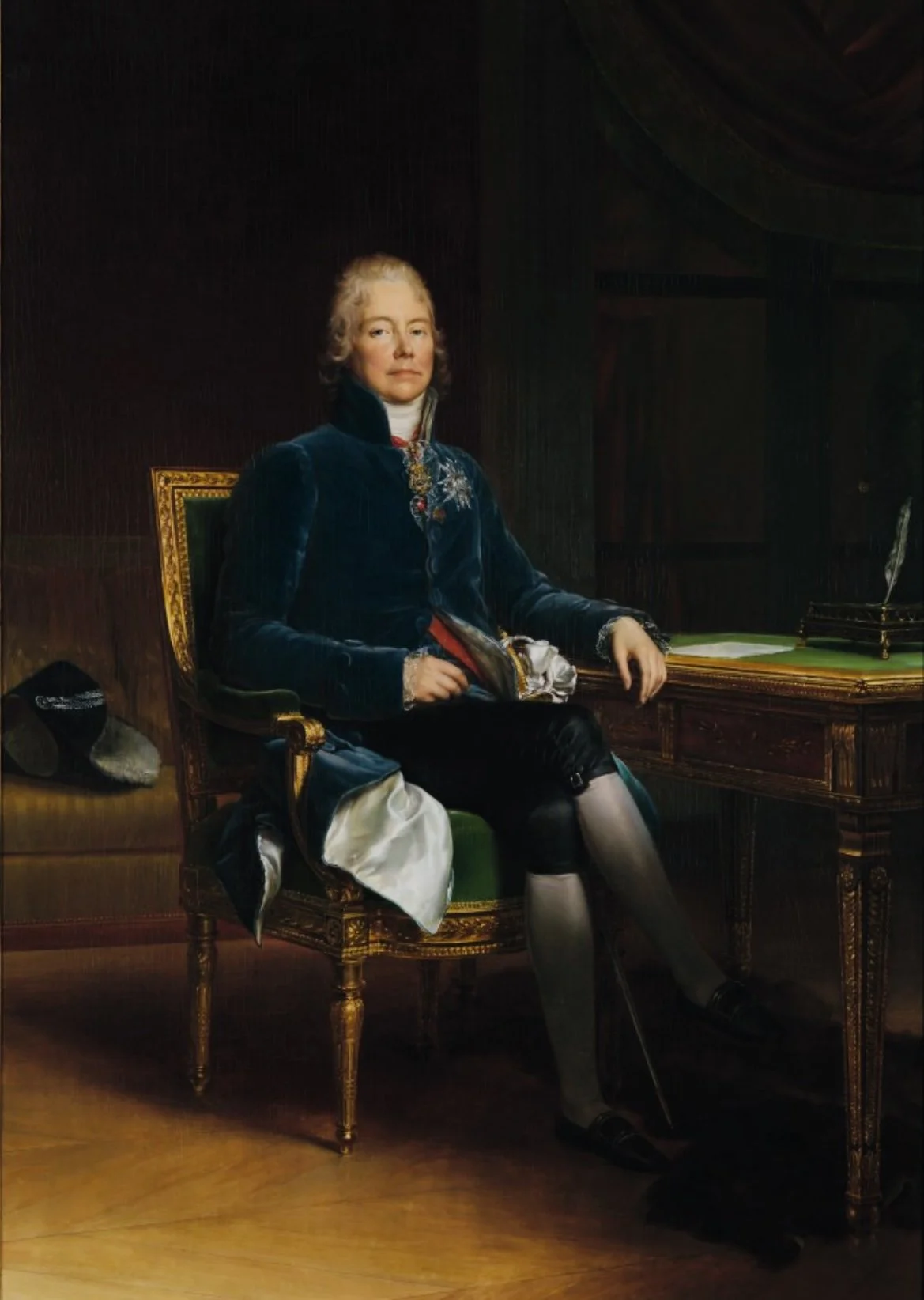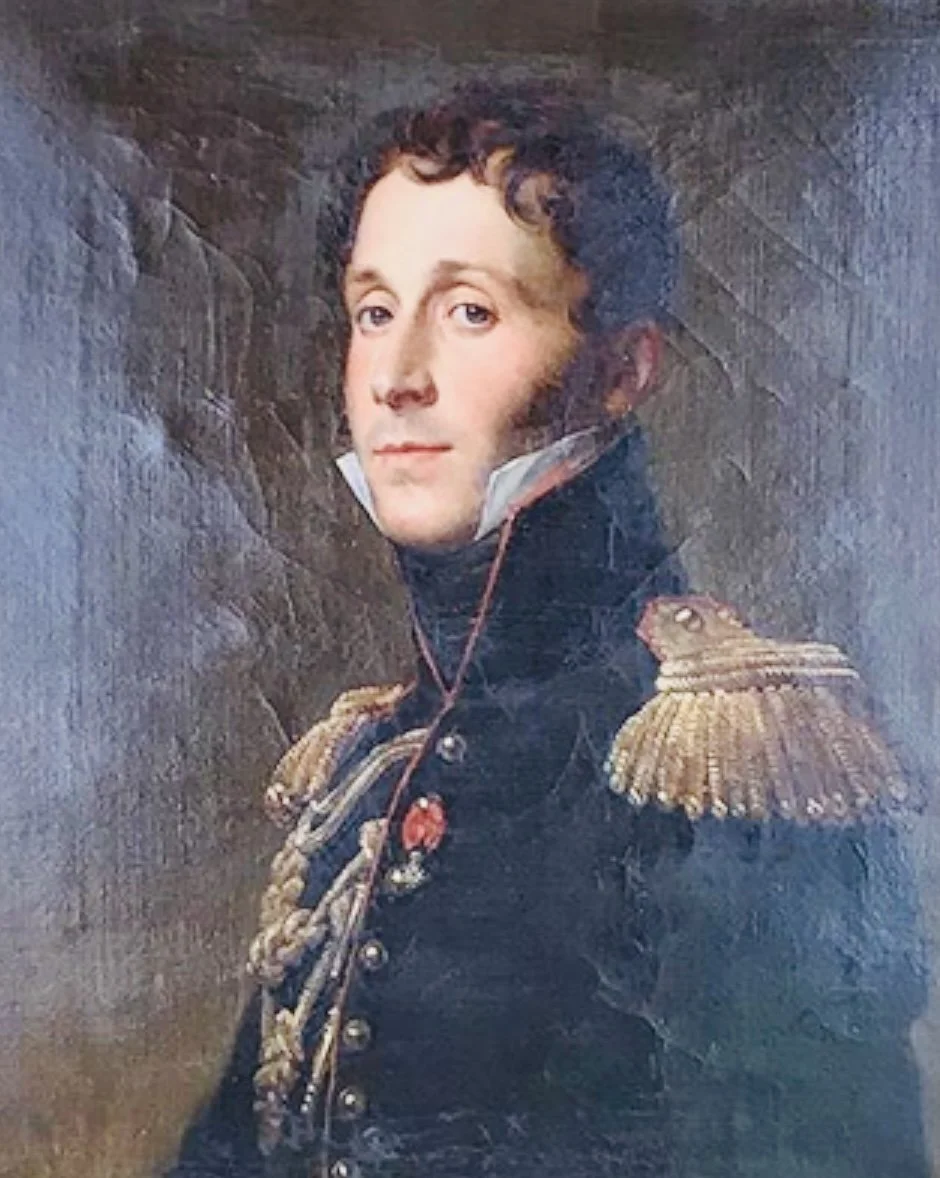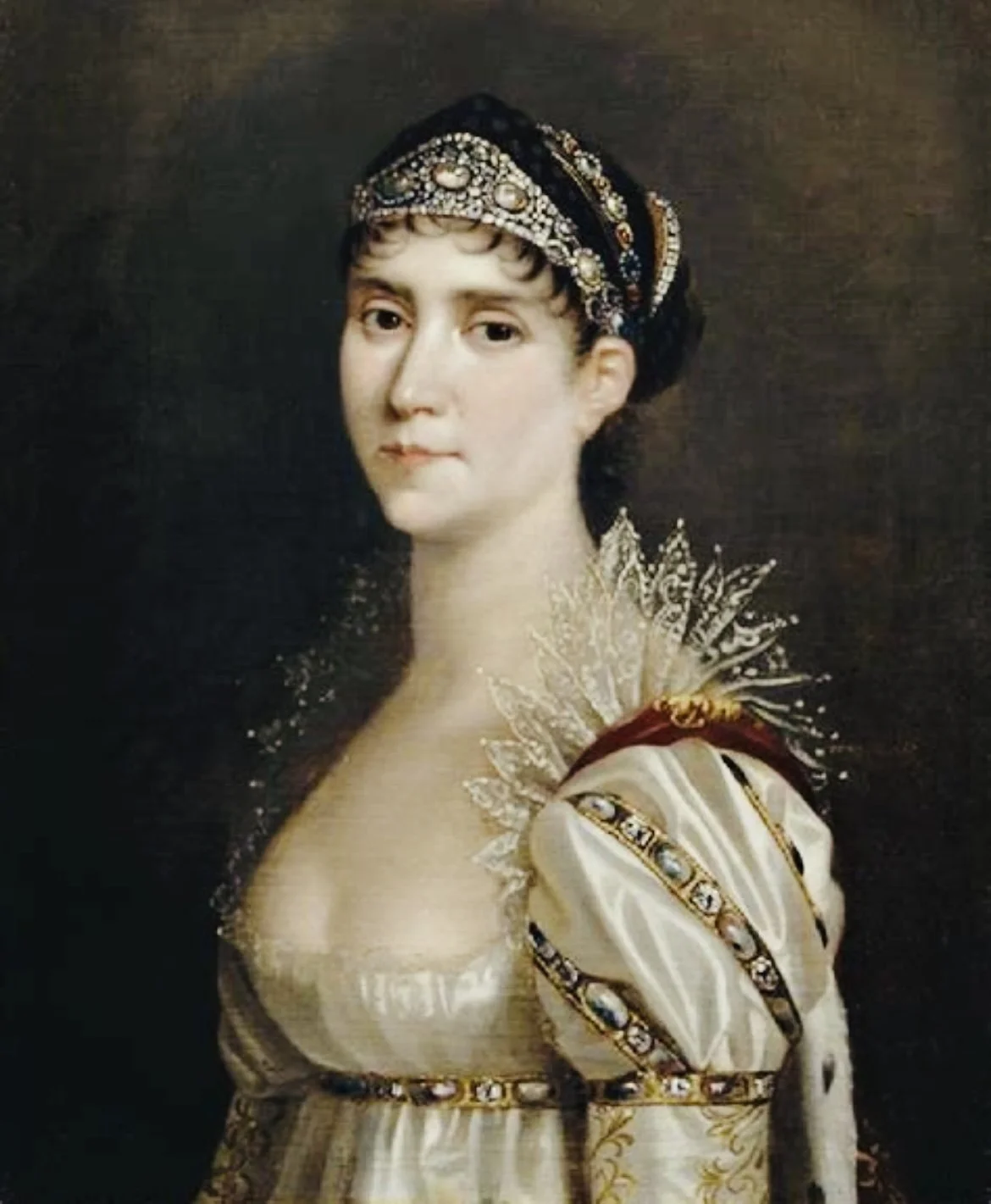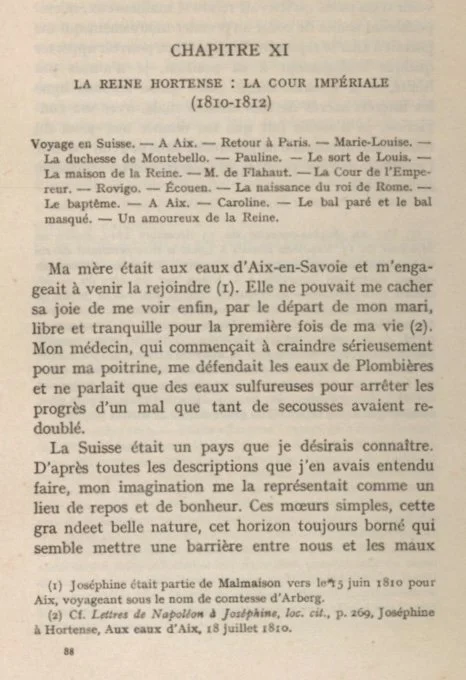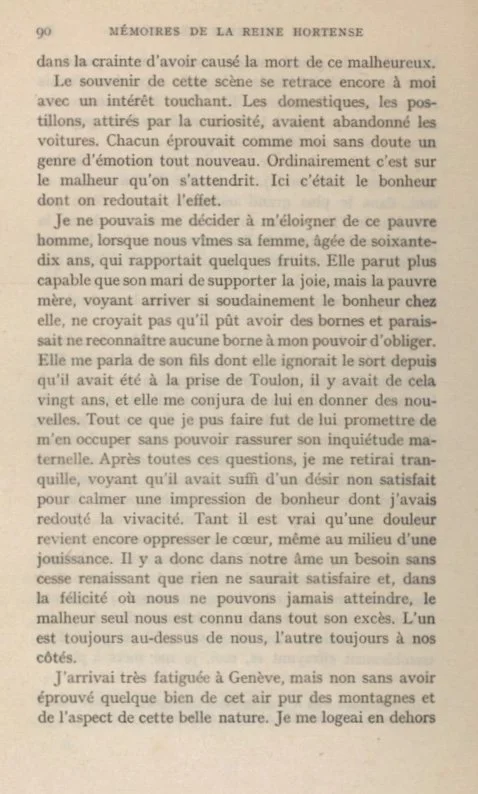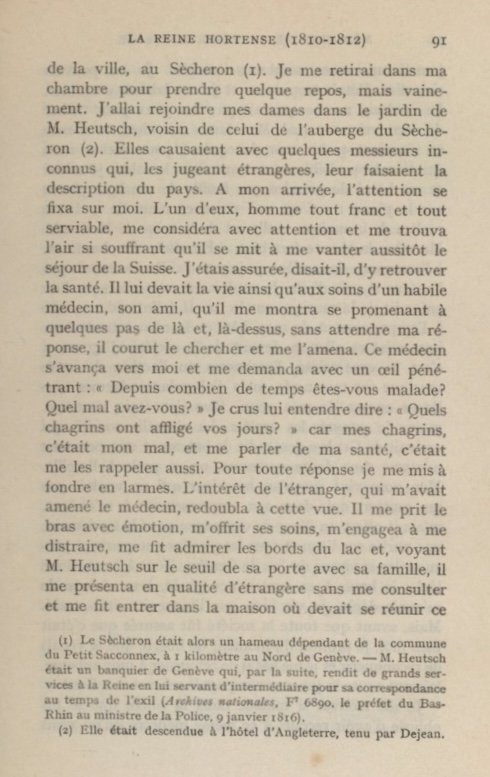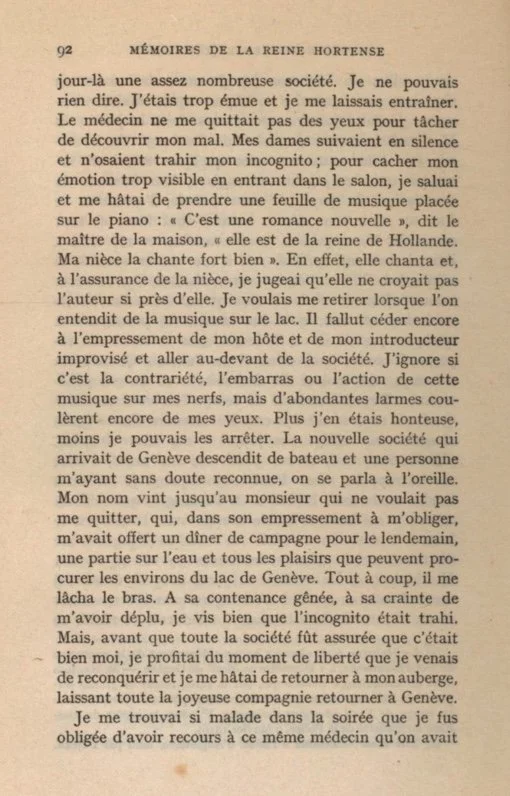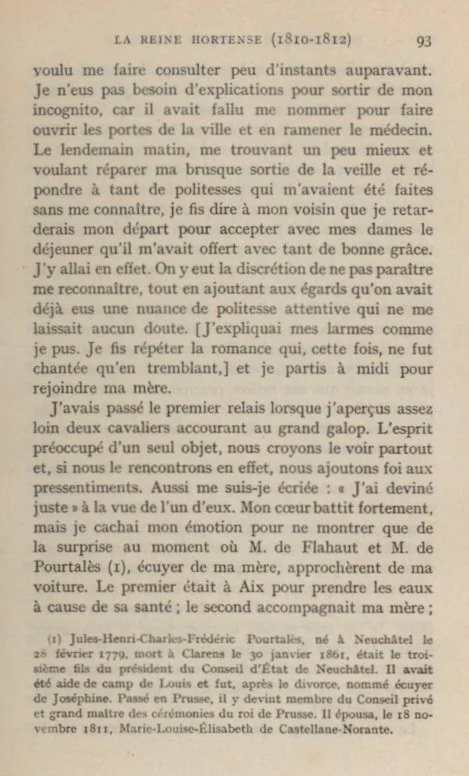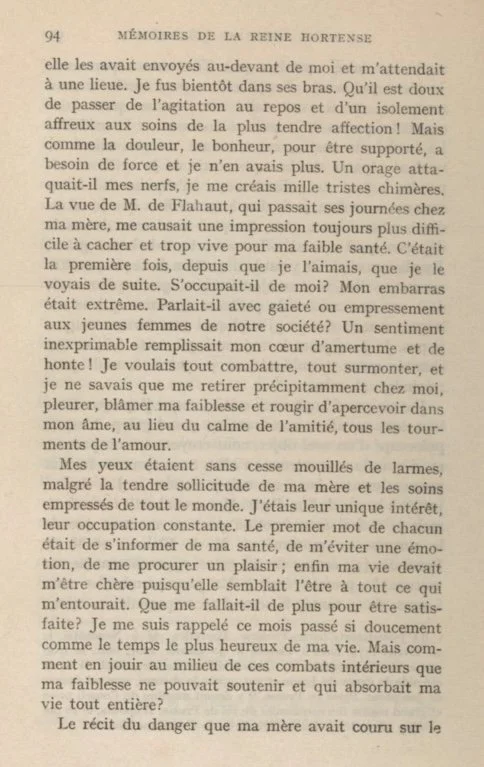Let’s have another look at Hortense’s Memoirs. If you want to read the book it is available for free at the side bar in English and French. Use the widget on the sidebar to translate the text below into pretty much any language.
Hortense tries another one of her incognito trips. She once again gets identified and finds that her music is genuinely popular with people.
Guess who happens to show up back in Hortense’s tormented life? Once again it’s Talleyrand’s “natural” son who just so happens to have quite a talent for getting rich women to love him: Charles de Flahaut.
I constantly advocate learning to spot the agents to avoid their traps. I can’t imagine there have ever been more “Flahauts” than today. I think it’s because their paymasters have never had this amount of control over money at the international level. “Flahauts” are all over the internet tryIng to direct our behavior to the detriment of our best interests. They pose as our friends but they are not our friends.
Now whenever you see Hortense’s name anywhere it says next to it that she had an illegitimate son with Flahaut. Even that German disinformation agent brought it up to knock Hortense’s memory. Was that part of the plan? We see in these memoirs that Flahaut chased Hortense around as a cloud of infiltrators engineered her life into an abyss. This is a case study of the international spy system at work.
While the paymasters can continue to hide, the agents cannot and they are very easy to spot now that we understand their patterns and what identifies them. Namely they are easily spotted because they pretend to be the opposite of what they really are. What they really are is a group of right wing extremists with a collectively murderous agenda. Exposing agents is a great way to neutralize the power of the “order out of chaos” crowd.
Hortense’s memoirs continues:
CHAPTER X
THE QUEEN HORTENSE : IN THE DAYS OF MARIE-LOUISE: THE KING OF ROME (1810-1812)
Visit to Switzerland—Aix-en-Savoie—The Duchesse de Montebello—Pauline—The Fate of Louis—The Queen's Household—Monsieur de Flahaut Again—At the Emperor's Court—The Duc de Rovigo—The Birth and Baptism of the King of Rome—Caroline—Two Balls in February, 1812—A Man Who Loved a Queen.
MY mother was at the springs of Aix-les-Bains and urged me to join her there. She did not conceal her satisfaction at seeing me at last entirely free and independent, thanks to my husband's departure.
My physician, who was extremely worried about my lungs, forbade my going to Plombieres and thought that only sulphur springs could stop the progress of a disease which recent events had aggravated.
Switzerland was a country I was anxious to become acquainted with. From all the descriptions of it I had heard I imagined it must be a peaceful spot where one could be quiet and happy.
The simple life of the inhabitants, the grandeur and impressive beauties of the land-scape, the limited horizon which seemed to place a barrier between us and the evils of the outer world, all caused me to feel that here was a place where one could find that ideal felicity I had long ago abandoned all hope of ever encountering.
Aix-en-Savoie lay so close to the frontier of this beautiful country that I could not resist the temptation to enter it. I sent all my traveling carriages along the French road that leads through Geneva.
I and half my household in absolute incognito—for fear of incurring the anger of the Emperor, who would not have granted me permission to leave French soil—followed the highway that leads to Besançon, Pontarlier and Lausanne.
I was so weak that two servants were obliged to carry me in a little specially constructed chair whenever the road became too tiring. In one of these excursions I noticed a sort of hut which I thought was uninhabited.
It was placed between two trees and exposed to the wind and rain. Nevertheless, I entered. An old man was sitting there on a wooden chair, all alone; his legs were covered with straw and he appeared completely destitute.
He told me he was nearly a hundred years old, that he had taken part in the Battle of Fontenoy and lived there on such alms as the travelers happened to bestow. My first impulse was to put an end at once to his misery. I was on the point of giving him a considerable sum of money when I suddenly stopped.
Entire relief coming unexpectedly might prove too great a shock. Therefore, I sent for wine to be brought from my carriage.
As I fed it to him myself, spoonful by spoonful, I added to the heap of napoleons which I placed in his hand.
Finally, his joy became so keen that he was seized with a terrible fit of palsy, and I burst into tears, fearing that my charity would result in the death of this unhappy being. I can still recall the details of this touching scene. My servants and my postilions, out of curiosity, had deserted the carriages.
Like me each of them felt a hitherto unknown emotion. Usually it is misfortune that arouses one's sympathy. In this case it was joy that proved terrifying. I was still standing beside this poor old man when we saw his wife, who was seventy years old, appear with some fruit which she had secured for him.
She seemed, at first, to be better able to bear the sudden change in their fortunes than her husband. But the poor mother at the sight of the miracle that had taken place imagined anything was possible and even thought I could work as many more as I pleased.
She told me about her son, from whom she had had no news since he had taken part in the siege of Toulon twenty years before, and implored me to tell her what had become of him. I could only promise to make inquiries.
This promise was enough to soothe her maternal anxiety. After she had asked me many questions I withdrew, satisfied at having discovered that a single unfulfilled desire is enough to dampen too intense a joy.
Thus, grief returns to sadden us even in the midst of our happiness. It seems as though our soul must always retain insatiable longing, which nothing can appease. Perfect content can never be attained, utter grief is all we are capable of experiencing.
The former is always above us, just beyond our grasp; the latter never leaves our side. I arrived at Geneva, having already benefited somewhat from the pure mountain air and the beauties of the scenery.
My lodgings were outside the town at the little village of Le Secheron. I was still very weak and weary. In vain I tried to rest in my rooms and finally I joined my ladies in waiting in the garden of Monsieur Heutsch, which was next to the inn.
They were talking with several unknown gentlemen who, seeing they were strangers, were describing the surrounding country to them. When I appeared, the general attention turned to me.
One of the gentlemen, a kind and obliging man, looked at me attentively. Seeing how ill I was, he at once began to speak of the beneficial effects of the Swiss climate. He assured me it would do me good.
He owed his own life partly to the excellence of the climate, partly to the care of one of his friends, a skilful physician whom he pointed out to me, strolling about a short distance off.
Thereupon, without waiting for me to reply the stranger hurried off and returned with the doctor. The latter stepped up to me and said, with a penetrating glance, "How long have you been ill? Just what is the trouble?"
I thought he was asking, "What are the sorrows which are shortening your days?" For it was my sorrows which lay at the root of my illness, and to speak of the latter was to remind me of the former.
The only answer I could make was to burst into tears. The sympathetic interest of the stranger who had brought the doctor to me increased at the sight of my distress.
Deeply moved he took my arm, offered to look after me, urged me to seek amusement, pointed out the beauties of the lake. Seeing Monsieur Heutsch standing in the doorway of his home he introduced me without asking my permission as a foreign visitor and made me go into the house, where that day there happened to be a fairly numerous gathering.
I made no effort to resist. I was too deeply moved to be able to speak. The doctor kept watching me in order to discover what was the cause of my illness. My ladies followed us silently, not venturing to reveal my incognito.
In order to conceal my too clearly visible emotion as I entered the drawing-room I bowed and, walking over to the piano, picked up a piece of music.
“It is a new romance," said my host. "It was written by the Queen of Holland. My niece sings it very well." She proceeded to do so, and the self-assurance of the performer made me quite sure that she had no idea the author was beside her.
I was about to withdraw and return to the inn when we heard sounds of music on the lake. I was obliged to yield once more to the insistence of my host and the gentleman who had introduced me and go to meet the new arrivals.
I cannot say whether it was because of my embarrassment, my fatigue or the effect of the music on my nerves, but my tears continued to flow abundantly. The more ashamed I was to weep, the less I was able to stop.
The new arrivals, who had come from Geneva, left their boat, and one of them having doubtless recognized me, people began to whisper to one another. Finally my name reached the ears of the gentleman who had remained with me and who, so anxious was he to make himself agreeable, had offered me a dinner in the country for the next day, to be followed by a boating party and all the other pleasures one may enjoy in the suburbs of Geneva.
Immediately he let go my arm. His embarrassed manner, his evident fear of having displeased me showed me that my incognito had been broken. But without giving the party time to make sure that it was really I whom they had been entertaining I took advantage of a moment's liberty and hurried back to the inn, letting the others go on to Geneva.
That evening I felt so ill that I was obliged to send for the same doctor who a few hours before had been asked to diagnose my case. I did not need to enter into any explanations as in order to have the gates of the town opened to allow the doctor to come to where I was I had been obliged to give my name.
The next morning, feeling a little better and wishing to make up for my abrupt departure on the preceding day and to return all the politeness that had been shown me although my identity had been unknown, I sent word to my neighbor that I was postponing my departure so as to take advantage of his kind offer of a luncheon party for me and my ladies.
At luncheon people were tactful enough to appear not to have recognized me. But in addition to their previous attentions they added a respectful manner which made it perfectly clear that they knew who I was. I explained my tears as well as I could.
The ballad was sung over again at my request but this time with a distinct shyness. At noon I left to meet my mother. I had just passed the first posting-house when, some distance off, I caught sight of two horsemen dashing toward me at full speed.
When our minds are full of some particular person we fancy that we see him everywhere, and if we do happen to meet him we believe our intuition has been correct. That was why at the sight of one of the approaching horsemen I exclaimed, “I was right, it is he." My heart beat violently, but I hid my emotion and displayed only surprise when Monsieur de Flahaut and Monsieur de Pourtales, my mother's equerry, appeared beside my carriage.
The former was staying at Aix, taking the waters there on account of his health, the latter accompanied my mother. She had sent them ahead to meet me and was waiting for me a little farther on.
A few moments later I was in her arms. How marvelous it is to exchange agitation for calm, loneliness for tender affection!
But to bear either grief or happiness one must have strength, and mine was exhausted. If a storm came up my nerves were on edge; I conjured up a thousand imaginary phantoms.
The sight of Monsieur de Flahaut, who spent his days with us, provoked an emotion which became steadily more and more difficult to conceal. It was more than my feeble health could bear.
For the first time since I knew that I loved him, I now saw him constantly. If he devoted himself to me, I felt extremely embarrassed; if he was gay and attentive with the young ladies who were with us, an indescribable feeling of bitterness and shame filled my heart.
I wished to conquer all my emotion. All I could do was to retire to my room to weep, blaming my weakness and blushing to find in my soul instead of a calm friendship all the torments of love. My eyes constantly swam with tears in spite of my mother's tender solicitude and that of those about her. Everything revolved about me.
The first thing everyone inquired about was my health, the most important thing in the world was to find something that amused me, to keep something from me that might upset me. At last I came to consider that my life must be worth something because so many other people seemed to think it precious.
What more did I need to make me happy? I have always remembered this quiet month as the happiest time I ever knew. But how could I enjoy it in the midst of those inner conflicts, which were more than my feeble health could bear and which absorbed all my energy?
The original French is available below:

